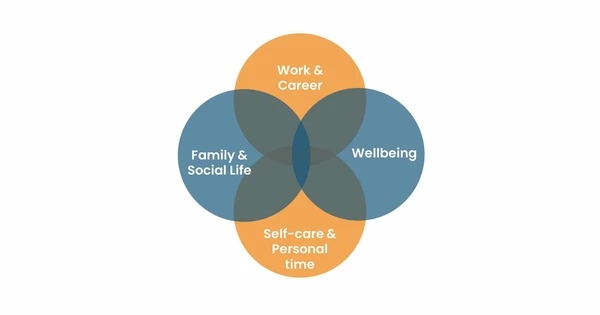The work-life interface refers to the connection and relationship that exists between an individual’s professional or work-related components of their life and their personal or non-work aspects. It is the meeting point of work and personal life. It includes the ways in which work and personal life interact. Many parts of one’s personal life, such as family, leisure, and health, might overlap with employment. Achieving a healthy work-life balance is frequently regarded as necessary for general well-being and contentment.
The work-life interface is bidirectional; for example, work can interfere with private life and private life can interfere with work. This interaction can be either negative (e.g., work-life conflict) or positive (e.g., work-life enrichment). According to recent studies, the work-life interface has become more fluid, particularly for people who have access to technology. Work-life balance is the harmony between personal life and career work.
Here are key aspects of the work-life interface:
- Work–Life Balance: This concept entails striking a balance between the time and energy engaged in work and personal life. It tries to minimize burnout and improve general well-being by ensuring that one’s work obligations do not take precedence over personal and family demands.
- Flexible Work Arrangements: Many firms have embraced flexible work arrangements such as telecommuting, flexible hours, reduced workweeks, or part-time work to better manage the work-life interface. Employees have more influence over their work schedules with these possibilities.
- Technological Impact: Technological advancements have blurred the distinction between work and personal life. While technology allows for flexibility, it can also foster a “always-on” culture in which employees may find it difficult to detach from work outside of regular hours.
- Stress and Burnout: Poor work–life balance can contribute to stress and burnout. Long working hours, high job demands, and a lack of autonomy can negatively impact an individual’s overall well-being. Managing stress and maintaining a balance are crucial for sustained productivity and mental health.
- Organizational Support: Employers have an important role in promoting a good work-life balance. Employees are more satisfied and engaged in organizations that focus employee well-being, provide perks such as parental leave, and foster a healthy workplace culture.
The work-life interface is inextricably linked to an individual’s career goals and progress. Balancing professional development with personal life goals necessitates careful planning and consideration of long-term goals.
Achieving an ideal work-life interface is a continuous process that needs individual and organizational attention, adaptability, and teamwork. A balanced approach can result in increased job satisfaction, better mental health, and an overall higher quality of life.
















